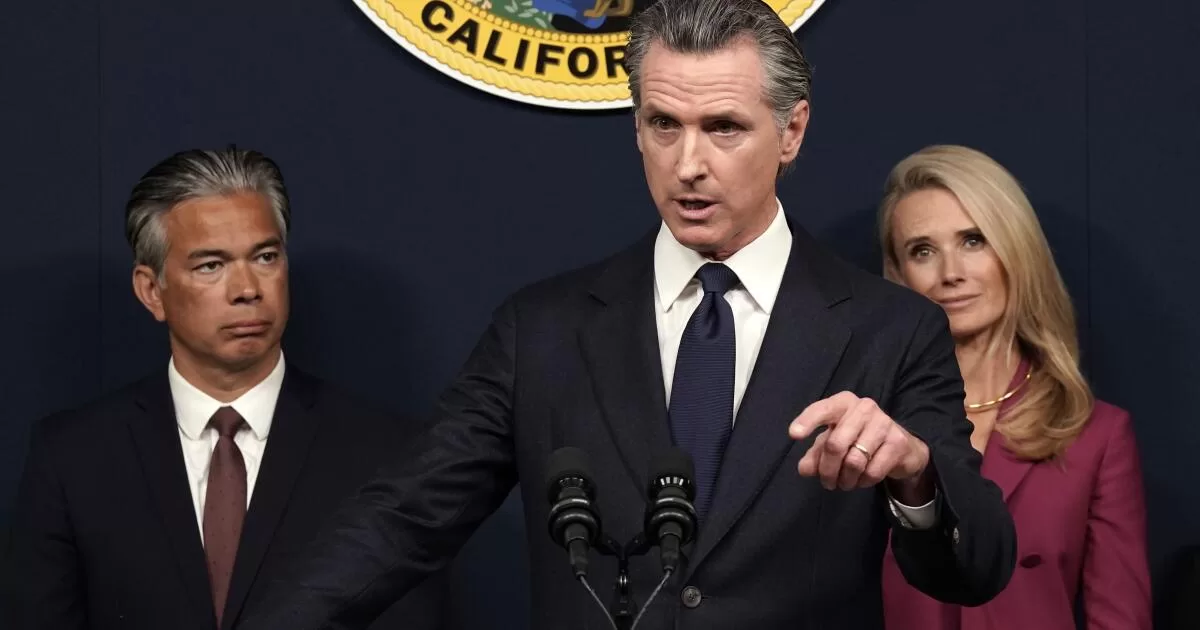Launching his first salvo less than 36 hours after former President Trump was again elected to the White House, Gov. Gavin Newsom on Thursday convened a special session of the state Legislature to increase legal funding to defend civil rights, climate change, access to abortion, disaster funding and other California policies from a conservative federal agenda before the inauguration in January.
Newsom’s preemptive strike signals the return of the hostile relationship between Democratic-controlled California and the Trump administration that was a hallmark of the Republican’s first term.
“The freedoms we hold dear in California are under attack — and we won’t sit idle,” Newsom said in a statement. “California has faced this challenge before, and we know how to respond. We are prepared to fight in the courts, and we will do everything necessary to ensure Californians have the support and resources they need to thrive.”
The new special session provides an early look at Newsom’s plan to wage an aggressive and highly visible campaign to shield California from the Trump White House while leading Democrats in the culture wars against the Republican Party.
In an interview in Orange County on Sunday, the Democratic governor warned that California will be dealing with a different Trump than the politician who won the presidency in 2016.
“This is the revenge and retribution 2.0 version,” Newsom said.
In his acceptance speech early Wednesday, Trump declared that America had given him “an unprecedented and powerful mandate.”
Newsom’s special session proclamation says his administration anticipates that the incoming president could seek to limit access to abortion medication, pursue a national abortion ban, dismantle clean air and water environmental protections, repeal the Deferred Action for Childhood Arrivals program and withhold federal disaster response funding, among other promises he made during the campaign.
As part of its effort to prepare for a potential Trump presidency, the Newsom administration completed an analysis of Project 2025, which has been described as a playbook for a new GOP administration that includes plans for replacing thousands of career federal workers with Trump supporters who will carry out a far-right agenda.
Atty. Gen. Rob Bonta and Newsom’s office also reviewed more than 100 lawsuits California filed against the federal government during Trump’s first administration to pinpoint potential vulnerabilities for the state and map out the president-elect’s agenda.
Bonta called a news conference for Thursday morning to “discuss implications for California and preparations for a second Trump Administration” — another sign that the state’s top Democrats are preparing for legal battle.
The governor is asking lawmakers to provide additional funding to the California Department of Justice and other agencies in his administration to immediately file lawsuits and defend against litigation from and against the Trump administration.
The governor’s aides said increases to the state’s legal defense would be paid for with income tax revenues that have exceeded projections in the current fiscal year, but the amount of funding will be determined in negotiations at the state Capitol.
Newsom has called a special session two other times to achieve a policy objective, in his political battle with the oil industry. This also marks the second special session since lawmakers adjourned for the year at the end of August.
The new proclamation set the special session to begin on Dec. 2, the day newly elected lawmakers are scheduled to gather in the Senate and Assembly chambers to be sworn in. Legislators typically leave Sacramento after the ceremony to spend the holidays in their districts before returning for the regular session at the start of the year. The schedule for special session hearings has not yet been determined, but could take place in early January at the same time as the regular session.
Laws passed in a special session and signed by the governor typically take affect 90 days after the session adjourns. Urgency bills, which require support from two-thirds of lawmakers, become law immediately with the governor’s signature. Bills that appropriate funding also take effect with his approval.
Trump’s inauguration is Jan. 20.
